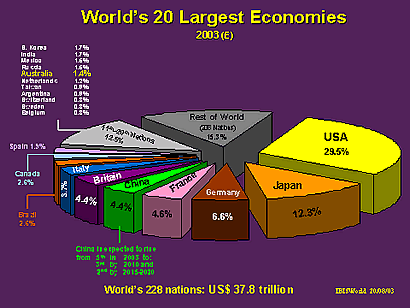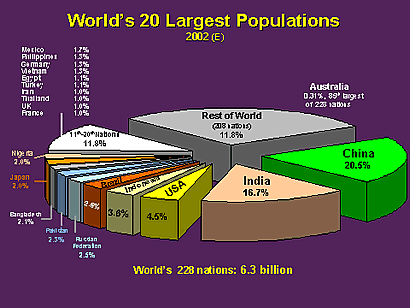China was the world’s largest economy (in purchasing power parity terms) for most of the last millennium, excluding the 19th and 20th Centuries, when it had largely ignored the industrial revolution.
Today it is the second-largest nation after the USA in economic size (PPP GDP) – although still just over half the size of the USA – and will be fifth largest in $US terms by the end of 2003, having climbed several rungs on the ladder over the past two decades.

Advertisement
China will have overtaken Britain by the end of 2003 calendar year, and France by the end of 2004 or early 2005. Sometime on or around 2010, it will overtake Germany; and between 2015-2020 it is expected to overtake Japan to become the world’s second largest economy in both US$ terms and PPP terms.
Will China then set its sights on the USA? Yes, but it is unlikely to overtake the USA easily or quickly. By the same token, a fast rising number two often gets more attention than number one, as we saw with Japan in the 1980s before Japan’s economy slowed to a halt in the 1990s and early years of this new Century.
If China is to overtake the USA, it is expected to be in the second half of the 21st Century; and that feat, if achieved, would make this the Chinese century.
China has the numbers, of people that is. With 1.3 billion citizens (20.5 per cent of the world) it is the world’s most populous nation followed by India (16.7 per cent) then the USA (4.5 per cent).

China’s sheer population size is a challenge. Democracy is emerging, albeit at slightly better than glacial pace. When it does, the competing interests of such a vast, scattered and income-polarised society will be enormous. So too will leading and governing a fifth of the world’s population, some three times that of Western Europe and almost five times that of the USA.
Advertisement
How long can such a vast nation keep growing its economy at 7 per cent per annum? For some considerable time, possibly, but not for decade after decade. All other things being equal, China would need to grow its GDP at 3 per cent per annum faster than the USA for some 65 years to catch the world’s number one. An improving exchange rate against the $US would, of course, shorten this period.
On the other hand, in PPP terms, China will overtake the USA much sooner; perhaps in 20 years time. So, it depends on how things are measured.
In the meantime, China’s progress is having an impact on both the Asia Pacific region and the world at large. The Olympic Games will focus even more attention on this emerged superpower.
Discuss in our Forums
See what other readers are saying about this article!
Click here to read & post comments.